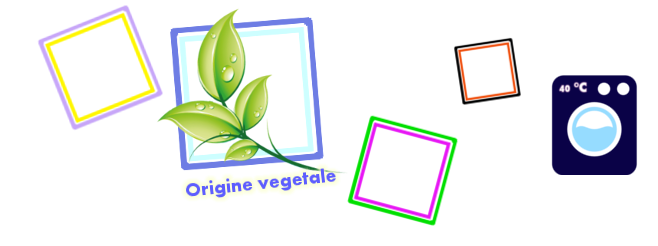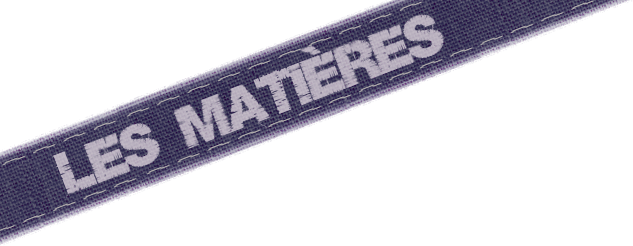
" Synthetic, natural or artificial, textiles are full of of materials with particularities all more attractive than the Other. We accompany you in this labyrinth of textile fibers which can sometimes be hard to understand. "
- Index -
A - C - E - F - L - M - N - P - R - S - V

 Acetate: Recognizable by its final rendering of quality that is close to silk. Acetate is a fiber obtained when combining natural cellulose (plant cell) and acetic acid. Often compared to silk for its brilliance, softness and its fluidity, acetate dyes easily and dries quickly. This Fiber is regularly used for clothing linings because crease-resistant but also for the comfort it provides. With a rendering Very aesthetic, it is not uncommon to find acetate combined with other fibers in order to exploit its various advantages.
Acetate: Recognizable by its final rendering of quality that is close to silk. Acetate is a fiber obtained when combining natural cellulose (plant cell) and acetic acid. Often compared to silk for its brilliance, softness and its fluidity, acetate dyes easily and dries quickly. This Fiber is regularly used for clothing linings because crease-resistant but also for the comfort it provides. With a rendering Very aesthetic, it is not uncommon to find acetate combined with other fibers in order to exploit its various advantages.
Abbreviation : CA or CA; Washing tip: Maximum wash at 30 °C in cycle delicate, ironing at low temperature. The use of the dryer is Avoid. 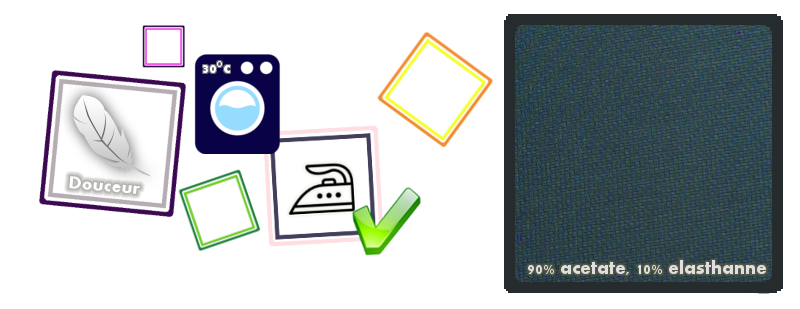
 Acrylic: Alone or in combination with another Synthetic fiber, acrylic offers a final rendering of a great Lightweight, silky and soft to the touch. In addition to its advantageous aspect, It has a high resistance and good insulating power. Wrinkle-resistant and with a composition for rapid drying, Acrylic allows professionals to offer articles that do not requiring no ironing. This fiber with many advantages, is used in many fields other than textiles. For example, its Wear resistance and elasticity, allow it to be used for certain soil coverings.
Acrylic: Alone or in combination with another Synthetic fiber, acrylic offers a final rendering of a great Lightweight, silky and soft to the touch. In addition to its advantageous aspect, It has a high resistance and good insulating power. Wrinkle-resistant and with a composition for rapid drying, Acrylic allows professionals to offer articles that do not requiring no ironing. This fiber with many advantages, is used in many fields other than textiles. For example, its Wear resistance and elasticity, allow it to be used for certain soil coverings.
Abbreviation : PC or PAN; Washing tip: Machine wash at 40°C maximum. Not not go to the dryer. Ironing is often useless, but A warm iron is however supported by the fiber if necessary. 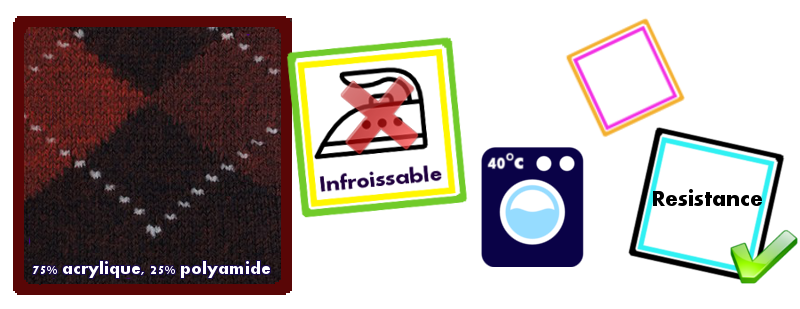

 Kashmir: Produced mainly in China and Mongolia, this fiber of animal origin is made with wool long and silky of a breed of goats from the region, which today gives its name "Kashmir". Cashmere is worldwide Known and recognized for its softness and warmth, and its guarantee of quality but also for its high price. Cashmere is also sometimes, associated with other materials to reduce costs. It differs from Wool by its shine and softness which are more accentuated.
Kashmir: Produced mainly in China and Mongolia, this fiber of animal origin is made with wool long and silky of a breed of goats from the region, which today gives its name "Kashmir". Cashmere is worldwide Known and recognized for its softness and warmth, and its guarantee of quality but also for its high price. Cashmere is also sometimes, associated with other materials to reduce costs. It differs from Wool by its shine and softness which are more accentuated.
Abbreviation :WS; Washing tip: Do not hesitate to wash your products in cashmere, in fact, water is beneficial to this fiber so that it keeps its softness and flexibility. Water also delays the onset small dumplings. Hand washing with special detergent Wool is recommended. Do not allow product to soak in water long. Ironing is possible with a soft iron and on the back of the product. 
 Cotton: Cotton is a vegetable fiber usually transformed into yarn, thus allowing its weaving. It is, at Today, the natural fiber that is, at the global level, the most Produced. Its success is partly due to the various advantages that Textile professionals have been able to draw from this plant. Indeed, in addition to Its cost is lower, the final rendering is soft and comfortable. Thus offering excellent value for money. Very low allergenic, Cotton is perfectly resistant to the treatments that may require textile manufacturing (dyes, printing, etc.). This one is also known and recognized, for its absorbency. This is also the case As a result of this advantage, it is used in large numbers for laundry of house for example.
Cotton: Cotton is a vegetable fiber usually transformed into yarn, thus allowing its weaving. It is, at Today, the natural fiber that is, at the global level, the most Produced. Its success is partly due to the various advantages that Textile professionals have been able to draw from this plant. Indeed, in addition to Its cost is lower, the final rendering is soft and comfortable. Thus offering excellent value for money. Very low allergenic, Cotton is perfectly resistant to the treatments that may require textile manufacturing (dyes, printing, etc.). This one is also known and recognized, for its absorbency. This is also the case As a result of this advantage, it is used in large numbers for laundry of house for example.
Acronym: CO; Washing tip: Cotton can be, depending on the weave and Washed concentration up to 95°C. However, it will be necessary to refer to the label on the product. Ironing is possible with a iron at moderate temperature. 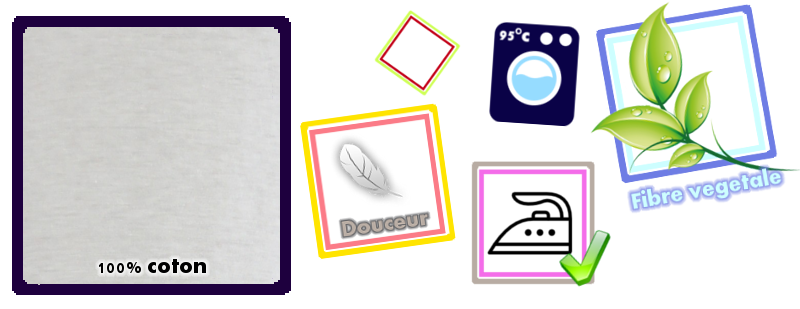
 Organic cotton: Expanding since In recent years, organic cotton production did not represent It is still a short time ago, that 0.1% of the total cotton production. Certified by different organizations, the production of organic cotton is entirely carried out without pesticides or industrial products. The The notion of "fair trade" is also often associated with the organic cotton. The advantages of organic cotton are almost identical to that of conventional cotton. Only the colors change. The professionals with only a small range of colors entering their Approach of respect for the environment. Besides the colors, the texture also evolves giving way to more softness and flexibility. The thickness of cotton is also increased.
Organic cotton: Expanding since In recent years, organic cotton production did not represent It is still a short time ago, that 0.1% of the total cotton production. Certified by different organizations, the production of organic cotton is entirely carried out without pesticides or industrial products. The The notion of "fair trade" is also often associated with the organic cotton. The advantages of organic cotton are almost identical to that of conventional cotton. Only the colors change. The professionals with only a small range of colors entering their Approach of respect for the environment. Besides the colors, the texture also evolves giving way to more softness and flexibility. The thickness of cotton is also increased.
Washing tip: When washing, do not exceed 40°C maximum. The use of the dryer is also not recommended. 
 Mercerized cotton: Mercerized cotton is everything simply a cotton fiber on which a solution was applied in order to inflate the matter. This allows the dye to Better penetrate. This treatment of the fibre also has the effect of make it brighter and even stronger. Mercerized cotton is Also known as pearl cotton.
Mercerized cotton: Mercerized cotton is everything simply a cotton fiber on which a solution was applied in order to inflate the matter. This allows the dye to Better penetrate. This treatment of the fibre also has the effect of make it brighter and even stronger. Mercerized cotton is Also known as pearl cotton.
Washing tip: Washing possible at 95°C. Irons easily with a warm iron. 

 Élasthanne : D'origine synthétique, et au confort apprécié, l'élasthanne est connu pour être une fibre élastique issue du polyuréthane. Ayant pour avantage de ne garder aucune trace des étirements qu'elle a pu recevoir. Celle-ci, est également plus résistante que d'autres fibres et épouse parfaitement le corps qu'elle englobe. Offrant ainsi, un effet seconde peau. L'élasthanne, est également connu pour sécher plus rapidement qu'un tissu ordinaire. Cette fibre est bien souvent associée à d'autres composants permettant ainsi la multiplication des avantages.
Élasthanne : D'origine synthétique, et au confort apprécié, l'élasthanne est connu pour être une fibre élastique issue du polyuréthane. Ayant pour avantage de ne garder aucune trace des étirements qu'elle a pu recevoir. Celle-ci, est également plus résistante que d'autres fibres et épouse parfaitement le corps qu'elle englobe. Offrant ainsi, un effet seconde peau. L'élasthanne, est également connu pour sécher plus rapidement qu'un tissu ordinaire. Cette fibre est bien souvent associée à d'autres composants permettant ainsi la multiplication des avantages.
Sigle : EL; Conseil de lavage : Une lessive douce et une température de 40°C maximum seront parfaitement appropriées au lavage de ce tissu. Ne pas utiliser de sèche-linge. Repassage possible si vraiment nécessaire avec un fer tiède.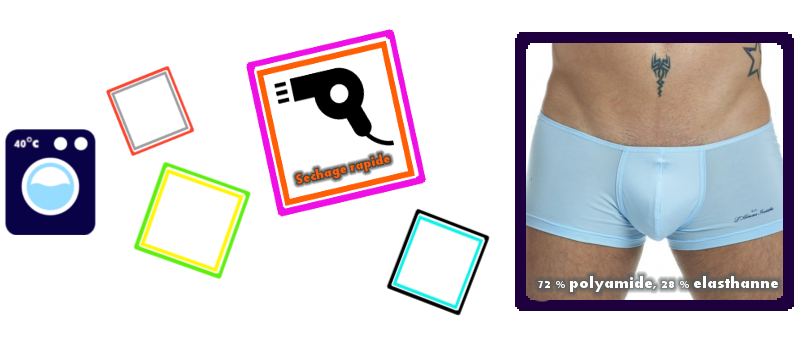

 Bamboo fiber: The environment is put to honor by this fiber. Indeed, composed of natural bamboo, we Let us find in it a raw material respectful of the environment. Respectful certainly, but it is far from being his only one advantage. And for good reason, in addition to its image already associated with ecology is a renewable natural plant that grows quickly; an advantage for farmers. In addition, this culture does not require No fertilizer and very little water, a benefit for the planet. Known and Now recognized, this plant has many assets ideally adapted to the world of textiles. With robust shoots it allows obtaining a silky, highly absorbent fabric (4 times more than cotton), anti-UV, antibacterial and anti-odor. Mixed with cotton, This fiber makes the textile non-deformable, not very wrinkle and very soft to the touch. To date it is important to dissociate bamboo fiber (more rare), manufactured using environmentally friendly processes, and bamboo viscose for which chemical treatment is required.
Bamboo fiber: The environment is put to honor by this fiber. Indeed, composed of natural bamboo, we Let us find in it a raw material respectful of the environment. Respectful certainly, but it is far from being his only one advantage. And for good reason, in addition to its image already associated with ecology is a renewable natural plant that grows quickly; an advantage for farmers. In addition, this culture does not require No fertilizer and very little water, a benefit for the planet. Known and Now recognized, this plant has many assets ideally adapted to the world of textiles. With robust shoots it allows obtaining a silky, highly absorbent fabric (4 times more than cotton), anti-UV, antibacterial and anti-odor. Mixed with cotton, This fiber makes the textile non-deformable, not very wrinkle and very soft to the touch. To date it is important to dissociate bamboo fiber (more rare), manufactured using environmentally friendly processes, and bamboo viscose for which chemical treatment is required.
Washing tip: Wash at 60 ° C maximum, the passage in dryer is possible. 

 Wool: Of animal origin wool is without No doubt and this since the dawn of time, the fiber associated with winter and cold. Soft at will, very light, surprisingly warm because Composed of 80% air, and almost crease-resistant, it comes from the fleece of sheep and other sheep.
Wool: Of animal origin wool is without No doubt and this since the dawn of time, the fiber associated with winter and cold. Soft at will, very light, surprisingly warm because Composed of 80% air, and almost crease-resistant, it comes from the fleece of sheep and other sheep.
Acronym: WO; Washing tip: Do not wash at more than 30°C. Tumble dryer not recommended. 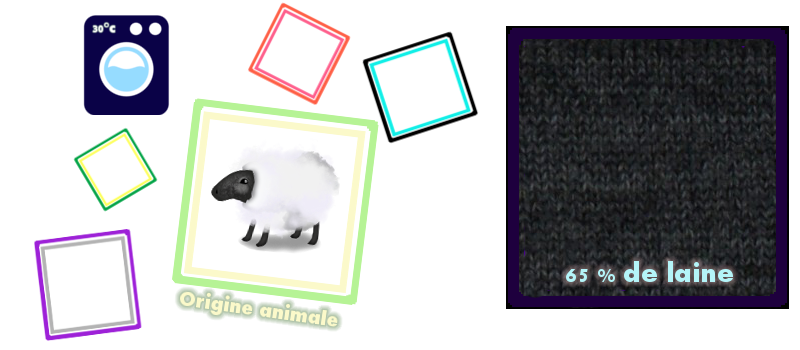
 Flax: This plant fiber is mainly produced by France, which is to date, the largest producer flax in Europe. Known and used for hundreds of years, flax comes from the stems of the plant with the same name. Soft in contact with The skin, solid and resistant, it has the advantage of not doing of soft toys. With low elasticity, it wrinkles easily and is Often used for its lightness and freshness appreciated in summer.
Flax: This plant fiber is mainly produced by France, which is to date, the largest producer flax in Europe. Known and used for hundreds of years, flax comes from the stems of the plant with the same name. Soft in contact with The skin, solid and resistant, it has the advantage of not doing of soft toys. With low elasticity, it wrinkles easily and is Often used for its lightness and freshness appreciated in summer.
Acronym: LI; Washing tip: Washes easily between 40°C and 60°C maximum. Recommended steam ironing. 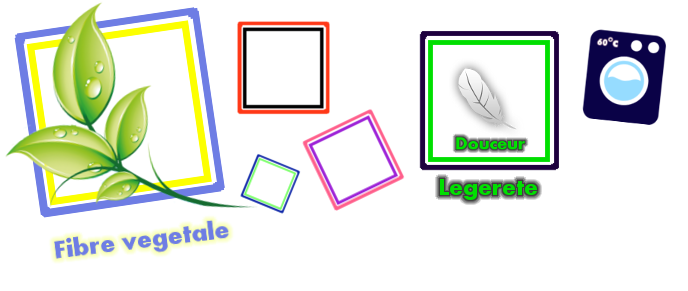
 Lyocell: Produced from wood pulp (mostly deciduous, eucalyptus and bamboo), lyocell is one of the New materials in vogue for its ecological benefits because biodegradable but above all from a production using little space and requiring little irrigation.
Lyocell: Produced from wood pulp (mostly deciduous, eucalyptus and bamboo), lyocell is one of the New materials in vogue for its ecological benefits because biodegradable but above all from a production using little space and requiring little irrigation.
Originally known as of Tencel, it is used in the world of textiles and is Also appreciated for making furniture or even paper.
The Lyocell stands out for its high strength and capacity of significant absorption. Smooth and elastic, this fiber is a Excellent alternative to cotton. With properties hypoallergenic, we can imagine a sharp increase in The use of this new fiber in the coming years... 

 Meryl polyamide: Meryl is a brand of Fiber known for its use of pure polyamide yarns. We Let us find in this fiber specially developed for comfort, the softness of cotton with however more lightness and fluidity. The Meryl is also designed to dry quickly thus offering a Extra comfort. Extremely resistant and permeable, it is Ideal for sportswear.
Meryl polyamide: Meryl is a brand of Fiber known for its use of pure polyamide yarns. We Let us find in this fiber specially developed for comfort, the softness of cotton with however more lightness and fluidity. The Meryl is also designed to dry quickly thus offering a Extra comfort. Extremely resistant and permeable, it is Ideal for sportswear.
Washing tip: Maintenance at 30 ° C recommended, unnecessary ironing but possible with an iron at moderate temperature. 
 Modal: Almost identical in all respects to the viscose, the modal differs however by its resistance more important to laundry and hard water. We find in the modal, the luminous rendering and vibrant colors that characterize the viscose. Having a large absorption capacity it is in the most cases associated with other subjects.
Modal: Almost identical in all respects to the viscose, the modal differs however by its resistance more important to laundry and hard water. We find in the modal, the luminous rendering and vibrant colors that characterize the viscose. Having a large absorption capacity it is in the most cases associated with other subjects.
Abbreviation :MD; Washing tip: Washing possible with a temperature below 40°C. Not suitable for tumble dryers. Ironing with Caution at moderate temperature. 
 Modal microphone: At the final rendering even more Sought that the modal, this fiber of plant origin stands out by its finesse and sweetness here multiplied. Particularly allied Well to cotton for their common benefits, it is not uncommon to see the two associated materials. The micro modal, just like the modal retains its resistance to the various washes that time requires while keeping its sweetness.
Modal microphone: At the final rendering even more Sought that the modal, this fiber of plant origin stands out by its finesse and sweetness here multiplied. Particularly allied Well to cotton for their common benefits, it is not uncommon to see the two associated materials. The micro modal, just like the modal retains its resistance to the various washes that time requires while keeping its sweetness.
Washing tip: Wash at 40°C maximum, do not use a tumble dryer. Ironing possible with a warm iron. 

 Nylon: Nylon is a synthetic fiber known for its flexibility, extensibility and strength. This one is part of the same family as polyamide. Having low power Absorbent, nylon allows rapid drying and is therefore regularly used to make swimsuits. This has the advantage of Do not wrinkle.
Nylon: Nylon is a synthetic fiber known for its flexibility, extensibility and strength. This one is part of the same family as polyamide. Having low power Absorbent, nylon allows rapid drying and is therefore regularly used to make swimsuits. This has the advantage of Do not wrinkle.
Instruction from Washing: Washing and drying possible with a low temperature program. Ironing is usually not necessary. 

 Polyamide: Polyamide is a fiber synthetic known for its elasticity. Very flexible and looking silky, it is necessary to distinguish two types of polyamides, nylon and then perlon. Having both their usefulness, the Perlon has for particularity to be more resistant but less flexible than nylon. Waterproof and Relatively soft, polyamide has the advantage of not being Crumple and dry quickly.
Polyamide: Polyamide is a fiber synthetic known for its elasticity. Very flexible and looking silky, it is necessary to distinguish two types of polyamides, nylon and then perlon. Having both their usefulness, the Perlon has for particularity to be more resistant but less flexible than nylon. Waterproof and Relatively soft, polyamide has the advantage of not being Crumple and dry quickly.
Abbreviation :PA; Washing tip: Easy to maintain, polyamide can be machine washed at 30°C or 40°C. Ironing not necessary but possible with a warm iron. 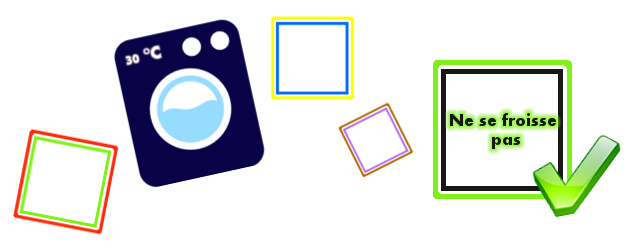
 Polyester: Polyester is a material synthetic. It is now used in the majority of destination of the textile sector. It also represents, on its own, 70% of synthetic fibres used in the textile industry. This Massive use is due to the different advantages characterizing it. Indeed, non-deformable, with fast drying and high resistance At tears, all elastic, polyester allows the realization of quality products and lasting over time.
Polyester: Polyester is a material synthetic. It is now used in the majority of destination of the textile sector. It also represents, on its own, 70% of synthetic fibres used in the textile industry. This Massive use is due to the different advantages characterizing it. Indeed, non-deformable, with fast drying and high resistance At tears, all elastic, polyester allows the realization of quality products and lasting over time.
Abbreviation :.PL; Washing tip: Washing possible and recommended at 40°C maximum - Do not use a dryer. Ironing possible, but not Necessary because polyester is crease-resistant. Beware of high heat This material melts, so a warm iron is sufficient. 
 Polyurethane: Polyurethane is better known under the name Lycra. It stands out for its extensibility and is none other than the Elastane fiber. " Lycra " being actually a trademark that was registered by a company producing elastane. We Let us therefore find in this fiber, the second skin effect obtained thanks to the proximity between body and matter.
Polyurethane: Polyurethane is better known under the name Lycra. It stands out for its extensibility and is none other than the Elastane fiber. " Lycra " being actually a trademark that was registered by a company producing elastane. We Let us therefore find in this fiber, the second skin effect obtained thanks to the proximity between body and matter.
Abbreviation :PURE; Washing tip: A wash at 40°C with a softened detergent is advised. Do not use a dryer. Ironing possible if really necessary with a warm iron. 

 Bamboo Rayon: Otherwise known as the Name of bamboo viscose, bamboo rayon is a fiber artificial. Made from bamboo which is the raw material. This fibre then undergoes a chemical transformation and thus loses the Ecological notoriety offered by this plant. Sweet and pleasant to the Worn, bamboo rayon is preferred to bamboo fiber for Its cost which is lower, but not only. Softer and more flexible that bamboo fiber, bamboo rayon has micropores allowing the tissue to breathe. It is therefore ideal for sportsmen for example. Its resistance to numerous washes as well as Different advantages associated with it, make that the use of This fiber is today, in full expansion.
Bamboo Rayon: Otherwise known as the Name of bamboo viscose, bamboo rayon is a fiber artificial. Made from bamboo which is the raw material. This fibre then undergoes a chemical transformation and thus loses the Ecological notoriety offered by this plant. Sweet and pleasant to the Worn, bamboo rayon is preferred to bamboo fiber for Its cost which is lower, but not only. Softer and more flexible that bamboo fiber, bamboo rayon has micropores allowing the tissue to breathe. It is therefore ideal for sportsmen for example. Its resistance to numerous washes as well as Different advantages associated with it, make that the use of This fiber is today, in full expansion.
Counsel washing: A wash at 60 ° C maximum with a conventional detergent allows good maintenance. With rapid natural drying, the use of tumble dryer is not necessary but possible at 40°C maximum. Ironing possible with a warm iron. 

 Spandex: Just like polyurethane / Lycra, spandex is none other than elastane. The name " Spandex" is simply used mainly in countries Saxon. Just like elastane, spandex is therefore original synthetic. With the main advantages are elasticity, its Resistance and its ability to have a second skin effect. Drying fast, and the fact that no trace of the stretches received is kept, Also characterize spandex.
Spandex: Just like polyurethane / Lycra, spandex is none other than elastane. The name " Spandex" is simply used mainly in countries Saxon. Just like elastane, spandex is therefore original synthetic. With the main advantages are elasticity, its Resistance and its ability to have a second skin effect. Drying fast, and the fact that no trace of the stretches received is kept, Also characterize spandex.
Counsel washing: Washing at 40°C maximum is recommended - Do not use tumble dryer. A warm iron allows ironing but is to be used only if need be. 
 Silk: Silk is a fiber of origin animal, it is indeed generated by the silkworm during the Creation of his cocoon. You should know that the cocoon is actually realized of a single silk thread by the animal. At the expense of people in charge of spinning, to extract this single yarn without the break. For this, the same process has been used since the year 2500 BC. approximately. The extracted yarn is then combined with other yarns obtained from the same way, so that the final rendering, is more resistant and more thick. Once the silk thread is created, it is dyed and then woven into function of the desired final rendering. Light, fluid and very pleasant to Worn and touched, silk is associated with high-end products because Often used for nobility in the past. Although silk is a textile fixing perfectly well colors, and therefore easy to To work. Its production represents about 0.2% of production worldwide. A small percentage explained by its cost high.
Silk: Silk is a fiber of origin animal, it is indeed generated by the silkworm during the Creation of his cocoon. You should know that the cocoon is actually realized of a single silk thread by the animal. At the expense of people in charge of spinning, to extract this single yarn without the break. For this, the same process has been used since the year 2500 BC. approximately. The extracted yarn is then combined with other yarns obtained from the same way, so that the final rendering, is more resistant and more thick. Once the silk thread is created, it is dyed and then woven into function of the desired final rendering. Light, fluid and very pleasant to Worn and touched, silk is associated with high-end products because Often used for nobility in the past. Although silk is a textile fixing perfectly well colors, and therefore easy to To work. Its production represents about 0.2% of production worldwide. A small percentage explained by its cost high.
Acronym: SE; Washing tip: Hand wash or dry cleaner recommended. 

 Viscose: Based on plant origin and then Then transformed, this artificial fiber is obtained thanks to a part of the wood (cellulose). The varieties of wood used for this are: pine, beech and bamboo. Often compared to cotton for their common characteristics, viscose is indeed not very elastic but nevertheless has a large absorption capacity. Much smoother than cotton, viscose has a luminous rendering with colors shiny and a beautiful shine.
Viscose: Based on plant origin and then Then transformed, this artificial fiber is obtained thanks to a part of the wood (cellulose). The varieties of wood used for this are: pine, beech and bamboo. Often compared to cotton for their common characteristics, viscose is indeed not very elastic but nevertheless has a large absorption capacity. Much smoother than cotton, viscose has a luminous rendering with colors shiny and a beautiful shine.
Abbreviation: VI; Washing tips: Wash at a maximum of 40°C - Do not put in tumble dryer. Be careful in case of poor maintenance, viscose has tendency to shrink and deform. Ironing possible at low heat. 